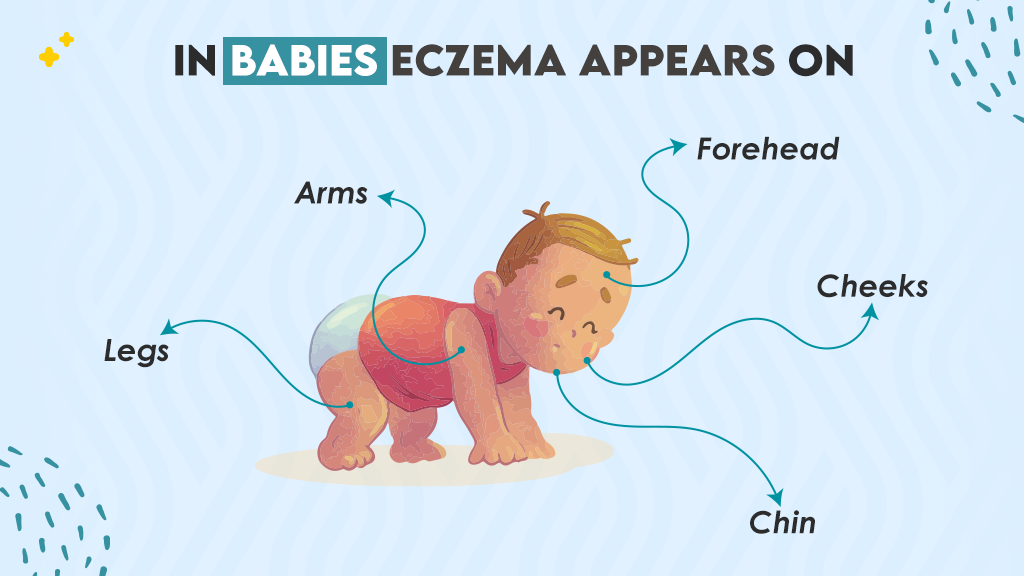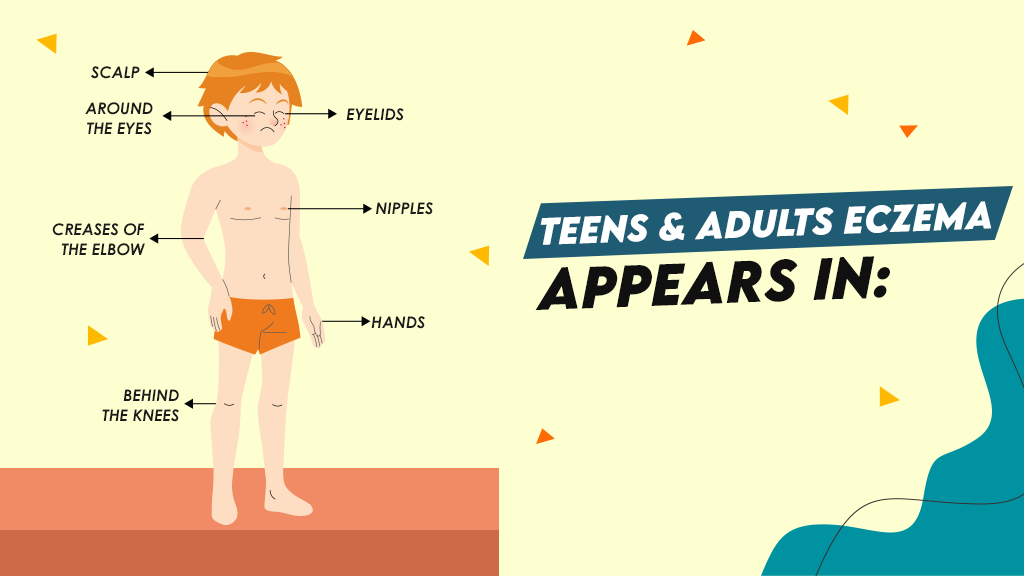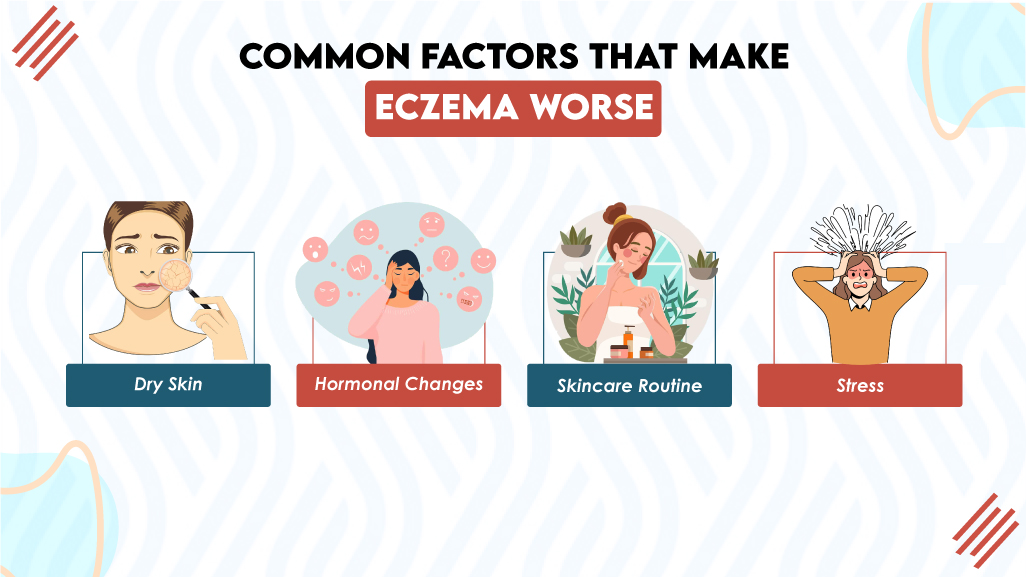
It’s a question we hear a lot… Does Eczema get worse with age? Or perhaps more hopefully: Does eczema go away with age?
The answer varies as much as the individual person, but chances are Eczema will always be a part of your life…but on different parts of your body! That’s right. Eczema apparently likes a change of scenery.
Do Babies Outgrow Eczema?

In babies and children, the good news is that it is possible to age out of Eczema. By age three, roughly 2/3 of infant Eczema cases, also known as Atopic Dermatitis, have improved or entirely disappeared, perhaps leaving behind a lifetime tendency for dry skin.
From infancy until about two years of age, the eczema will typically appear on:
- The face (forehead, cheeks, chin)
- The arms
- The legs
Eczema tends to run in families, but parents may not remember having it or may not know how to handle the condition in their infant. For tips on caring for a baby with Eczema, read this article, which summarizes everything you need to know, from proper skin products to clothing to common triggers.
As mentioned in the opening paragraph, a few kids will endure bouts of eczema into their adult life as eczema flare-ups.
Can Eczema Develop at Any Age?

According to old myths, only children are more likely and prone to developing eczema. However, we now know that eczema can develop at any age. There is also a chance that you will experience adult-onset eczema even if you never had it as a child.
And the chances are that Eczema, which comes on in adulthood, is here to stay. It will flare up from time to time due to various triggers such as stress, dry air, and harsh chemicals found in skincare products.
Among teens and adults, eczema tends to appear in different parts of the body than it does in babies. Classic areas include:
- Creases of the elbow
- Behind the knees
- Hands
- Scalp
- Around the eyes
- Eyelids
- Nipples
People over the age of 50 or 60 are also more prone to developing eczema than teenagers. However, managing eczema is quite easy and can be done at home. Just remember, no matter what happens, don’t scratch the eczema.
Does Eczema Get Worse With Age?
Now, let’s tackle the key issue at hand, Does eczema worsen with age? Yes, age can indeed make it worse. As we age, our skin tends to get dry more easily as it starts to lose its elasticity and ability to retain moisture.
This leads to a weakened skin barrier leading to the skin becoming less effective at protecting itself against outside irritants or repairing itself. Some common changes that you will experience as you age are:
- Thinning of epidermis and dermis.
- Decreased collagen and elastin production in skin
- Slower cell turnover
- Reduced blood flow
These changes in the skin, along with some common factors mentioned below, may work together to make your eczema symptoms worse.

Dry skin:
As we have discussed, as you age, it becomes difficult for your skin to retain moisture, which causes it to become dry more often. Dryness is one of the most common aggravating triggers for eczema. It can make your itchy skin even worse, especially at night, if proper care and attention are not provided to the skin.
Hormonal Changes:
This is a factor that is out of our control. As we age, our bodies experience changes not only on the outside but also on the inside. Hormonal changes in the body are quite common as you age, especially in women who are going through menopause.
These hormone changes can affect your natural skin barrier and make you more prone to experiencing itching, irritation, and dryness associated with eczema.
Skincare Routine:
As we have discussed before, the production of elastin and collagen decreases as you age, which makes it even more crucial that you take proper care of your skin.
If you are not following a proper eczema skincare routine, which includes using eczema body wash to keep your skin clean and an eczema cream to keep your skin moisturized on a daily basis, then the chances of your eczema getting worse as you age increase.
Stress:
Stress is a classic adult trigger. Even though the relationship between stress and eczema is still not clear, it is still one of the most common triggers that can cause a flare-up or make it worse.
Stress-related eczema on hands is also quite common in adults, especially those whose occupation includes the use of hands or regular hand washing. This makes stress management an essential part of skincare in adults.
Types of Eczema and Aging
Atopic dermatitis is one of the most common types of eczema experienced worldwide, however there are other types of eczema. As you have learned thus far, aging brings a host of changes to the body, and the skin is no exception. Aging makes adults more prone to developing these other types of eczema:
This usually causes dry, cracked, rough skin on the lower legs, arms, and sometimes on the torso. It is more prevalent in adults as their skin becomes dry more often, and the skin barrier is unable to retain moisture properly.
Also known as varicose eczema, this is quite common in older adults due to the poor circulation of blood in veins. This causes itchy, scaly patches and rashes to appear on the skin, mostly on the lower legs.
Seborrheic dermatitis, also known as cradle cap, causes inflammation, itching, flakes, and scales to appear mostly on the scalp, eyebrows, and beard, as well as redness around the nose and behind the ears.
The symptoms of these types of eczema may appear a little different from those of atopic dermatitis. So, if you are experiencing any change in your eczema symptoms or if your previous eczema treatment is not improving your condition, then it’s time to consult a doctor.
Treatment for Eczema

There is no permanent cure for eczema; however, there are a few things that you should always implement in your life, no matter what type of eczema you are experiencing.
Avoid the Triggers
The triggers may differ from person to person, which is why it is important that you keep an eye out for the things that make your eczema symptoms worse or cause an eczema flare-up. Some of the most common triggers in adults are:
- Dry skin
- Extreme weather conditions
- Harsh chemicals in skin care products and detergents
- Alcohol
- Smoking
- Stress
To prevent your condition from getting worse, you must avoid these triggers as much as possible. For stress, you can try different therapies, deep breathing techniques, and yoga.
If you are not sure what might be making your eczema worse consult a dermatologist.
Cleanse your Skin
Keeping your skin clean is essential whether you have eczema or not. It helps remove harmful bacteria, viruses, and dirt or excess oil buildup from your skin. To keep your skin clean daily, take a bath using an eczema shampoo and body wash.
Make sure the water you use to wash your skin is lukewarm and not too hot, as it can worsen dryness. Also, ensure that the eczema cleanser you are using is free from skin-irritating chemicals like fragrance, paraben, sulfate, dyes, and phthalates.
Keeping it Moisturized
One of the most prominent symptoms of eczema is dry skin, which becomes even worse as we age. So, it is crucial that you keep your skin moisturized as much as possible. To hydrate your skin, use a fragrance-free, hypoallergenic moisturizing cream for eczema twice daily.
You can also use it whenever you feel like your skin is becoming dry and rough. Don’t forget to moisturize your skin after a bath, as the skin is able to retain more moisture at that time.
Consult a Doctor
If you notice that your eczema is not getting better with these at-home treatments or you are experiencing symptoms on different parts of the body, you should consult a doctor.
The doctor may prescribe stronger prescription medication like topical steroid creams and ointments that can help soothe your eczema symptoms during a flare-up
Conclusion
So the simple answer to the question does eczema get worse with age? Yes, it does. As we age, our skin becomes thinner, and is unable to produce enough collagen and elastin, and its capacity to act as a barrier to the external environment weakens. This makes it more vulnerable and prone to becoming dry, itchy and irritated.
Also, certain types of eczema, such as stasis dermatitis and asteatotic eczema, are more common in older adults than in children and babies.
Eczema can become worse as you age, however, if you follow a proper skincare routine that includes the use of an eczema moisturizer and cleanser and avoid the triggers that make your condition worse, then you can prevent your eczema from getting worse.
FAQs
Why is my adult eczema getting worse?
There are various factors that can make your adult eczema worse. Some of the most common ones are
Dry skin
Stress
Chemicals in skincare products
High humidity and dry air
Also, your living style and eating habits can also make your eczema worse. So if you are not sure what is making your eczema worse it is best to consult a doctor so you can get the right treatment plan on time.
Can stress cause eczema?
Stress itself can not cause eczema. However, it can trigger a flare-up or make your existing eczema worse. When your body is under constant stress, it releases certain types of hormones known as cytokines that can cause inflammation and irritation.
Stress can also weaken your immune system and skin barrier function leading to worsened eczema symptoms.
What age does eczema peak?
Eczema usually peaks at the age of 2 or 4. However, this does not mean you can not experience it as an adult. There are certain types of eczema that are more likely to develop as you age.
How do you calm an eczema flare-up?
The best way to calm an eczema flare-up is to use the right eczema cleanser and keep your skin moisturized with an eczema cream as much as possible. Choose products that are free from skin-irritating chemicals and that contains natural soothing ingredients like licorice root extract and apple fruit extract.
You can also consult a doctor and use anti-itch creams and ointments or wet wrap therapy to soothe the intense itching associated with eczema.
